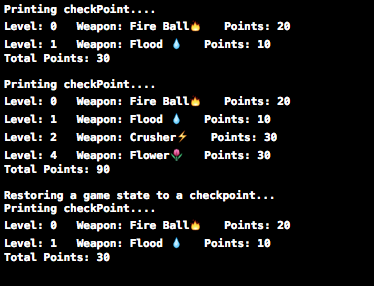A good snapshot stops a beautiful moment from running away. At some point, we’ll press the restore button and relive that moment again.
The memento pattern captures the complete state of an object into a memento that can be used to reset the object at a later date. It allows a complete reset of an object without the need to track and apply individual undo commands. – Design Pattern in Swift
//: Just a sign to show the class / struct is a memento, nothing special
protocol Memento {
}
//: The originator can create and restore game state
protocol Originator {
func createMemento() -> Memento
func applyMemento(memento: Memento)
}
//: a game state entry
struct GameStateEntry {
var level: Int
var weapon: String
var points: Int
}
//: A GameState memento, which contains all the information the CheckPoint needed to restore the state
struct GameMemento: Memento {
private let entries: [Int: GameStateEntry]
private let nextId: Int
private let totalPoints: Int
init(checkPoint: CheckPoint){
self.entries = checkPoint.entries
self.nextId = checkPoint.nextId
self.totalPoints = checkPoint.totalPoints
}
func apply(checkPoint: CheckPoint) {
print("Restoring a game state to a checkpoint...")
checkPoint.nextId = nextId
checkPoint.totalPoints = totalPoints
checkPoint.entries = entries
}
}
//: A CheckPoint can create and restore game state
class CheckPoint: Originator {
private var entries: [Int: GameStateEntry] = [:]
private var totalPoints: Int = 0
private var nextId: Int = 0
func addGameStateEntry(level: Int, weapon: String, points: Int) {
let entry = GameStateEntry(level: level, weapon: weapon, points: points)
entries[nextId++] = entry
totalPoints += points
}
func createMemento() -> Memento {
return GameMemento(checkPoint: self)
}
func applyMemento(memento: Memento) {
guard let m = memento as? GameMemento else { return }
m.apply(self)
}
func printCheckPoint() {
print("Printing checkPoint....")
entries.sort {$0.0 < $1.0}
.map {
print("Level: \($0.1.level) Weapon: \($0.1.weapon) Points: \($0.1.points) ")
}
print("Total Points: \(totalPoints)\n")
}
}
//:Testing
let checkPoint = CheckPoint()
checkPoint.addGameStateEntry(0, weapon: "Fire Ball", points: 20)
checkPoint.addGameStateEntry(1, weapon: "Flood", points: 10)
checkPoint.printCheckPoint()
let memento = GameMemento(checkPoint: checkPoint)
checkPoint.addGameStateEntry(2, weapon: "Crusher", points: 30)
checkPoint.addGameStateEntry(4, weapon: "Flower", points: 30)
checkPoint.printCheckPoint()
checkPoint.applyMemento(memento)
checkPoint.printCheckPoint()
